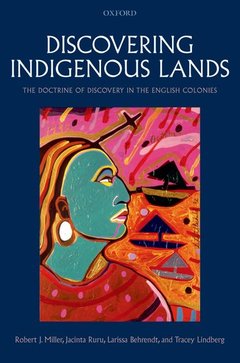Description
Discovering Indigenous Lands
The Doctrine of Discovery in the English Colonies
Authors: Miller Robert J., Ruru Jacinta, Behrendt Larissa, Lindberg Tracey
Language: English
Subjects for Discovering Indigenous Lands:
53.50 €
In Print (Delivery period: 21 days).
Add to cart
Discovering indigenous lands: the doctrine of discovery in the english colonies (paperback)
Publication date: 01-2012
320 p. · 15.6x23.4 cm · Hardback
Publication date: 01-2012
320 p. · 15.6x23.4 cm · Hardback
122.75 €
In Print (Delivery period: 21 days).
Add to cart
Discovering indigenous lands: the doctrine of discovery in the english colonies (hardback)
Publication date: 08-2010
320 p. · 16.2x23.8 cm · Hardback
Publication date: 08-2010
320 p. · 16.2x23.8 cm · Hardback
Description
/li>Contents
/li>Biography
/li>
This book presents new material and shines fresh light on the under-explored historical and legal evidence about the use of the doctrine of discovery in Australia, Canada, New Zealand, and the United States. North America, New Zealand, and Australia were colonised by England under an international legal principle that is known today as the doctrine of discovery. When Europeans set out to explore and exploit new lands in the fifteenth through to the twentieth centuries, they justified their sovereign and property claims over these territories and the Indigenous peoples with the discovery doctrine. This legal principle was justified by religious and ethnocentric ideas of European and Christian superiority over the other cultures, religions, and races of the world. The doctrine provided that newly-arrived Europeans automatically acquired property rights in the lands of Indigenous peoples and gained political and commercial rights over the inhabitants. The English colonial governments and colonists in North America, New Zealand, and Australia all utilised this doctrine, and still use it today to assert legal rights to Indigenous lands and to assert control over Indigenous peoples. Written by Indigenous legal academics - an American Indian from the Eastern Shawnee Tribe, a New Zealand Maori (Ngati Rawkawa and Ngati Ranginui), an Aboriginal Australian (Eualayai/Gammilaroi), and a Cree (Neheyiwak) in the country now known as Canada - Discovering Indigenous Lands provides a unique insight into the insidious historical and contemporary application of the doctrine of discovery.
1. The Doctrine of Discovery. 2. The Legal Adoption of Discovery in the United States. 3. The Doctrine of Discovery in United States History. 4. The Doctrine of Discovery in Canada. 5. Contemporary Canadian Resonance of an Imperial Doctrine. 6. The Doctrine of Discovery in Australia. 7. Asserting the Doctrine of Discovery in Australia. 8. Asserting the Doctrine of Discovery in Aotearoa New Zealand: 1840-1960s. 9. The Still Permeating Influence of the Doctrine of Discovery in Aotearoa/New Zealand: 1970s-2000s. 10. Concluding Comparatively: Discovery in the English Colonies.
Robert Miller is Professor of Law at Lewis & Clark Law School in Portland, Oregon. He serves as the chief justice for the Court of Appeals for the Grand Rone Community of Orego. He is an enrolled citizen of the Eastern Shawnee Tribe of Oklahoma. Jacinta Ruru is Senior Lecturer at the University of Otago, and is of Ngati Raukawa (Waikato), Ngati Rangi and Pakeha descent. Larissa Behrendt is Professor of Law and Director of Research at the Jumbunna Indigenous House of Learning of the University of Technology, Sydney. She is an Eualeyai/Gamillaroi woman. Tracey Lindberg is Associate Professor of Law at the University of Ottawa and Associate Professor of Indigenous Studies at Athabasca University. She is a member of the Saskatchewan bar. She is a Cree citizen (Neheyiwak) whose family is from the Kelley Lake Cree Nation.
© 2024 LAVOISIER S.A.S.




